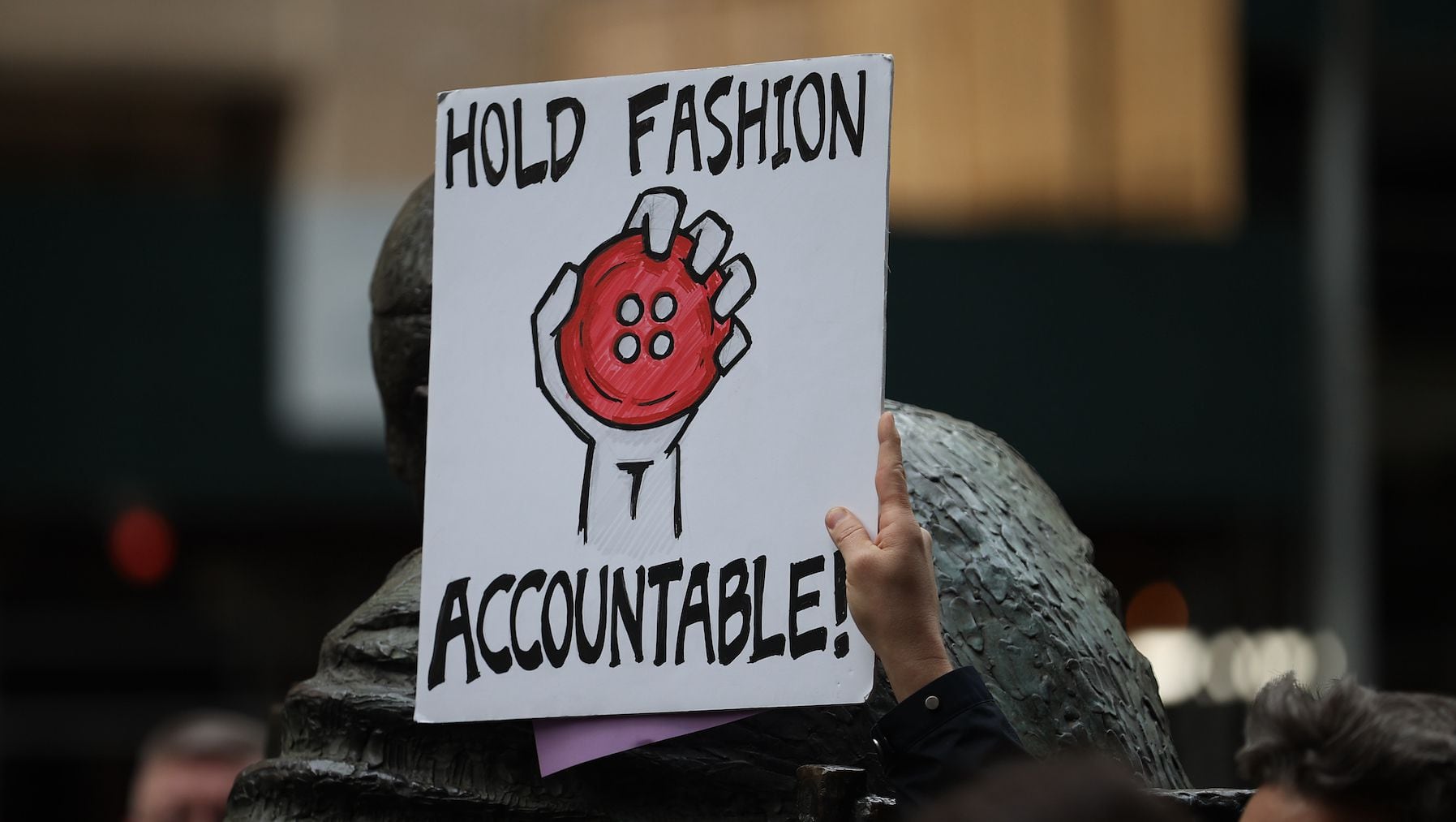
Over the last two years, New York’s state capital of Albany has become familiar territory for Maxine Bédat and Sara Ziff, who have been instrumental in pushing two landmark bills that aim to transform oversight of the fashion industry in one of its most significant markets.
Bédat, the founder of sustainable fashion think tank New Standard Institute, is one of the lead proponents of the Fashion Sustainability and Social Accountability Act. More commonly known simply as the New York Fashion Act, it aims to hold big brands accountable for their impact on workers and the environment by introducing new due diligence and reporting requirements, fresh climate obligations and sizeable fines for noncompliance.
Meanwhile Ziff, the founder of the model rights advocacy group Model Alliance, is a leading champion of the Fashion Workers Act, which seeks to regulate model management agencies and provide models with greater protection from exploitative practices.
Both bills were first introduced in 2022 and have navigated hurdles including legislative bottlenecks and pushback from a variety of industry and advocacy groups. But as the New York state legislature starts its 2024 session, backers of the legislative proposals say they have new momentum.
The Fashion Workers Act is back up for consideration after passing in the Senate last year, while The Fashion Act has picked up some 80 co-sponsors and backing from a broad swath of advocacy groups, as well as brands including Reformation, Patagonia and Stella McCartney.
Together with a third bill introduced last year that would require fashion brands to establish take-back schemes to collect and recycle old clothes, these legislative proposals represent the most comprehensive effort to regulate the fashion industry in the US, where political gridlock in Washington has made passing bills at a federal level extremely challenging.
Europe, which has a more hands-on approach to climate regulation, has already forged ahead with ambitions to “end fast fashion.” At the same time, last year’s record heat underscored the urgency of climate action, while Hollywood strikes drew attention to the vulnerabilities of workers in seemingly glamorous occupations. Still, the bills have a long road ahead during a busy election year with many other issues competing to dominate the conversation.
“Now is the time to get it done,” said Bédat. “But this will certainly be a critical moment for all sorts of reasons from the political environment to the environmental environment.”
Consensus Building and Pushback
The bills’ proponents have been working to build consensus around ambitious pieces of legislation that would transform the way the industry operates.
Simply getting legislators to pay attention to a sector that has been poorly understood and sometimes dismissed as too frivolous to be worth scrutiny is an achievement. When Bédat first started talking to lawmakers about the Fashion Act, most were surprised to learn about the scale of the industry’s environmental impact. Ziff had to explain the opaque and unregulated system of model management that has allowed bad actors to exploit vulnerable young people.
“We heard that over and over when we met with lawmakers that they were simply not aware this was a problem,” said Ziff. “You see the reaction on people’s faces when they understand what’s considered normal in this industry; they’re shocked.”
Under the Fashion Workers Act, agencies operating in the state would have to register with the Department of Labour, making it harder for scammers to entrap young hopefuls with the promise of making them the next big thing. Companies would be prevented from charging steep and mysterious fees for accommodation or other expenses that can leave models indebted to their management. The legislation would cap commission fees, require agencies to provide models with contract details for each job, make granting agencies power of attorney optional and place responsibility on management bodies to protect models from harassment, discrimination and unsafe working conditions.
The Fashion Act for its part would require brands with more than $100 million in revenue doing business in New York to map and monitor their full supply chain, address any abuses and set comprehensive climate targets. It’s scope would effectively cover every major fashion brand in the world and many mid-sized ones. Non-compliance could carry penalties of up to two percent of global revenue.
“Our intention is to increase human rights and the sustainability of the industry on a global scale,” said Anna Kelles, the New York state assembly member spearheading the Fashion Act.
Both bills have evolved since they were first introduced to incorporate feedback from industry and other stakeholders, with updated versions expected to be introduced for consideration this session.
“We have been meeting with brands, European brands, American brands, very large, big-name brands, workers rights groups, environmental groups, taking all of their input,” said Kelles, highlighting efforts over the last few months to build a broad base of support for the Fashion Act. “We have done so much legwork to educate the public, to get influencers on board, to get people from the industry on board, to get workers rights groups on board, to get environmental rights groups on board.”
Still, it remains unclear exactly where some of the industry’s biggest players stand on the proposed pieces of legislation.
The Council of Fashion Designers of America has publicly backed the Fashion Workers Act, but referred to the American Apparel and Footwear Association when asked about its position on the Fashion Act. The AAFA said it reviews all pending legislation through a framework published last year, which calls for harmonisation across jurisdictions, realistic timelines and a science-based approach to policy setting.
Last year, its director of sustainability, Chelsea Murtha, told BoF that the scope of the bill was “so overwhelming and all-encompassing” that it “makes people reluctant to grapple with it.” The industry trade group has hired two lobby firms in New York, according to public filings with the New York State Commission on Ethics and Lobbying in Government.
Other industry watchers have been more blunt. “The requirements [of the Fashion Act] are incredibly imposing for many fashion brands,” said Anthony Lupo, chairman at law firm ArentFox Schiff, arguing that smaller brands will struggle to comply. “I don’t think there’s a huge amount of support.”
The Fashion Workers Act has faced direct pushback from a group of modelling agencies who have hired the high-profile lobbying firm Bolton-St. Johns to advocate against the bill, according to Ziff. Elite Model Management, Wilhelmina International and Ford Models have all retained the firm, public filings show. The companies did not provide comment.
Dale Noelle, a former model who went on to found True Model Management, said she supports the aims of the bill, but takes issue with some of its language and gaps in its coverage. Among other things, more focus is needed on the issue of AI, there should be better provisions for overtime and tougher penalties should be put in place for clients who don’t pay in a timely manner, she said.
“It is essential for lawmakers to have meetings with more industry professionals, review these bills more closely and consider enhancements and amendments to the bills to ensure that models and the industry receive the necessary support and safeguards they deserve,” she said in an email.
An amended version of the Fashion Workers Act with small changes, including a measure requiring models to give informed consent around the use of AI-generated images, is expected to be introduced for consideration this session, according to a person familiar with the situation.
The hurdles still facing both bills points to the messy, complex nature of the legislative process. It can take years for a bill to pass through the New York state legislature and efforts to regulate the fashion industry are still relatively young. But whether these bills are enacted this year, or take longer, change is coming to the industry, with policymakers in other jurisdictions already making moves.
“No-one can ignore this issue; it’s coming in Europe or it’s coming somewhere else,” said Lupo.



